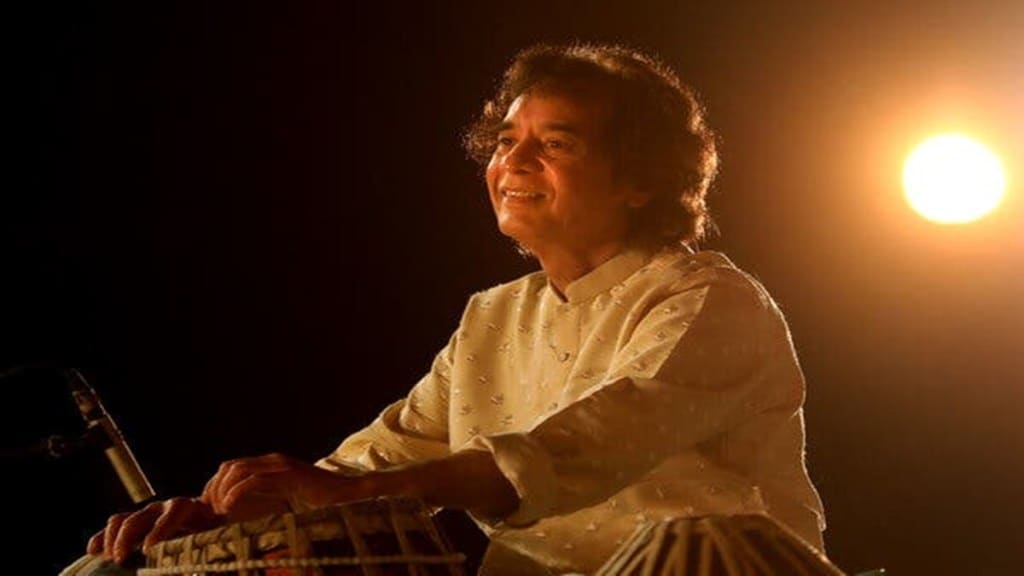For rhythms that touched the divine. For the unforgettable Doordarshan moments shared with your father, the legendary Ustad Alla Rakha Khan. For the magic that illuminated screens whenever you appeared. For the timeless appeal of your iconic Wah Taj ad. For the joyous wisdom, you imparted on taal, tirkit, bols, and riyaaz to eager listeners. And, above all, for your radiant, cherubic smile that warmed countless hearts—Zakir Hussain, today the world bows in reverence.
Yesterday, as news of your passing resonated, the tabla lost its maestro, and music lost one of its most luminous stars. Your journey from the hallowed traditions of Indian classical music to global stages where genres melded was nothing short of legendary. Today, as you join luminaries like Ustad Rashid Khan and Ustad Ashish Khan in celestial harmony, the heavens gain a divine rhythm. The world is poorer tonight, but the skies are alive with your beats. Who knows? Perhaps the universe itself is reverberating with your taal.
Your final act at the Konark Dance and Music Festival, years ago, was a masterclass in artistry and humility. Collaborating with the distinguished sarangi virtuoso Sabir Khan, you enchanted the audience, seamlessly blending peshkars, layakari, and tukdas with humour and wisdom. Your remarks—“We always begin with peshkars composed by our revered gurus to seek their blessings”—echoed your devotion to tradition. And when you created the sound of damru and shankh on your tabla, it was as if Lord Shiva himself had whispered through your fingers.
Born into the lineage of rhythm, you embraced your heritage with an open heart and an expansive mind. In the 1970s, your tabla became a bridge between worlds. Whether performing alongside Pandit Ravi Shankar at the Fillmore East, collaborating with George Harrison on Living in the Material World, or forming the iconic Indo-Jazz band Shakti with John McLaughlin, your art transcended boundaries. Each performance wasn’t merely an act; it was a dialogue, a communion of cultures, souls, and ideas.
Your collaborations with American icons like Earth, Wind & Fire and your groundbreaking solo album ‘Making Music’ showcased your genius in weaving East and West. Awards—from the Padma Shri to the Sangeet Natak Akademi Award—graced your illustrious career. Yet, beyond accolades, it was your ability to connect—to teach, to inspire, to create—that made you eternal.
The late tabla legend Zakir Hussain once shared a captivating tale about his father, Ustad Alla Rakha, and his unconventional way of honouring Saraswati, the Hindu goddess of knowledge and music. This poignant memory, recounted by Zakir, offers insight into the deep cultural roots and artistic reverence that defined his life.
Zakir fondly recalled how, as an infant, he was cradled by his father, who adhered to a tradition of whispering prayers into the ears of a newborn. Yet, instead of typical Islamic invocations, Alla Rakha chose to speak tabla rhythms, a gesture that reflected his unwavering devotion to his craft and his belief in music as a spiritual offering. Zakir shared how his father, a devout Muslim, viewed his rhythms as a form of prayer, saying, “I am a devotee of Goddess Saraswati and Lord Ganesh.”
As he used to say not to use the word Ustad before his name, let us not say Ustad Zakir Hussain. He will feel happy in heaven if we say Mr Zakir Hussain, Zakir Hussain or Zakir Hussain ji
And now, Zakirji, your rhythm is infinite. May your legacy inspire a thousand Zakir Hussains to carry forth the taal you so lovingly nurtured. The world of music bows to you. In honouring his wishes, as he often appealed to audiences during his performances, let us refrain from calling him ‘Ustad’ and instead remember him as Zakir Hussain ji or Mr. Zakir Hussain.


